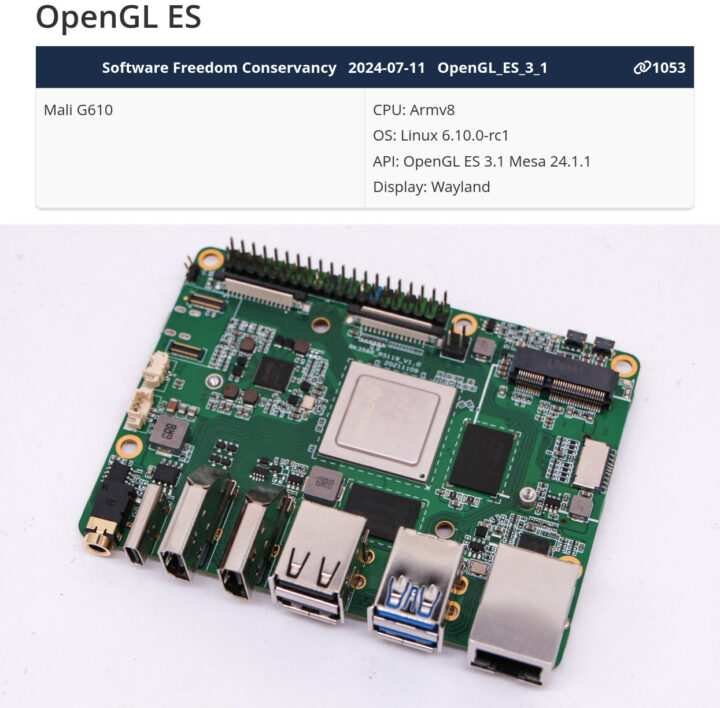Collabora has just announced that the Panthor open-source GPU kernel driver for third-generation Arm Valhall GPUs (Arm Mali-G310, Mali-G510, Mali-G610, and Mali-G710) has now achieved OpenGL ES 3.1 conformance with the Arm Mali-G610 GPU found in the Rockchip RK3588 SoC.
Just a few days ago, Linux 6.10 was released with “support for Mali CSF-based GPUs found on recent Arm SoCs from Rockchip or Mediatek”, as expected from the earlier article entitled “Panthor open-source driver for Arm Mali-G310, Mali-G510, Mali-G610, and Mali-G710 GPUs to be part of Linux 6.10” published last March. But this did not say anything about the level of support for the Valhall GPU since it’s common for new hardware to be added with minimal support, and OpenGL ES 3.1 compliance means it’s ready for business…
Collabora’s announcement explains this was tested on a Radxa Rock 5B single board computer:
The conformance tests ran on a Rock5b board under Linux 6.10.0-rc1. This version of Linux contains the new Panthor kernel driver for Mali v10 […] The RK3588 SoC used in the Rock5b is a popular chip for Arm-based single board computers. Having support for it upstream in both Mesa and the kernel means that Linux distributions can now easily support graphics acceleration on these devices.
So not only the kernel driver is now compliant, but the userspace driver has been upstreamed to Mesa (24.1.1), meaning 3D graphics acceleration will now work with fully open-source drivers on the Rockchip RK3588 SoC and other SoCs with Arm Valhall GPUs can be supported too. This follows Panfrost OpenGL ES 3.1 conformance with Mali-G57 GPU in 2022.
It’s another good software news for the Rockchip RK3588 SoC that recently got support for NPU-accelerated LLM, and is already usable with mainline Linux for some applications as shown in the Linux mainline matrix provided by Collabora, although admittedly there’s still some work to do for multimedia open-source drivers for the VPU (video decoder/encoder), MIPI DSI/CSI display and camera interfaces, and a few other drivers.
Collabora still plans to do more work on the Panfrost and Panthor drivers, notably:
- Support for performance counters to assist programmers in optimizing their graphics code
- Support for device coredump to assist in debugging firmware and driver issues
- Support for the new Arm AFRC compression format for frame buffers
- Improving memory management to allow better behavior in low-memory situations
- General performance improvements
- Vulkan support (this may take a while)

Jean-Luc started CNX Software in 2010 as a part-time endeavor, before quitting his job as a software engineering manager, and starting to write daily news, and reviews full time later in 2011.
Support CNX Software! Donate via cryptocurrencies, become a Patron on Patreon, or purchase goods on Amazon or Aliexpress





